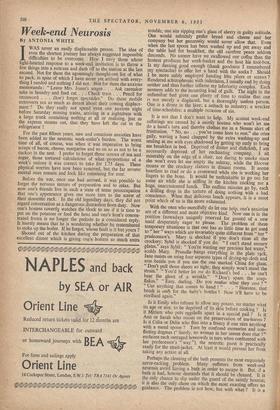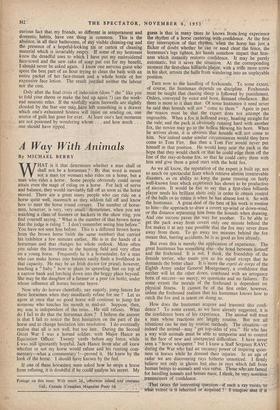Week-end Neurosis
By ANTONIA WHITE IWAS never an easily displaceable person. The idea of even the shortest journey has always suggested impossible difficulties to be overcome. How I envy those whose light-hearted response to a week-end invitation is to throw a few things into a suitcase and dash off to the station at the last second. Not for them the agonisingly thought-out list of what to pack, in spite of which I have never yet arrived with every- thing I needed and nothing I did not. Not for them the anxious memoranda: " Leave Mrs. Jones's wages . . . Ask caretaker take in laundry and feed cat . . . Check train . . . Pencil for crossword . . . Don't forget spectacles." Do these mobile extroverts not so much as dream about their coming displace- ment ? Do they really not spend even one anxious night before Saturday missing trains, arriving in a nightdress with a large trunk containing nothing at all or realising, just as the express steams out, that they have left the cat in the refrigerator ?
For the past fifteen years, new and conscious anxieties have been added to the neurotic week-ender's burden. The worst time of all, of course, was when it was imperative to bring scraps of bacon, cheese; margarine and so on so as not to be a cuckoo in the nest. I prefer to forget those screws of tea and sugar, those tortured calculations of what proportions of a week's rations it was correct to take for 1.75 days. These physical worries have now been removed, but the far severer mental ones remain and look like remaining for ever.
Before the war, once one had arrived, it was possible to forget the nervous terrors of preparation and to relax. But now one's friends live in such a state of tense preoccupation that one's appearance gives one more turn to the screw of their domestic rack. In the old legendary days, they did not regard conversation as a dangerous distraction from duty. Now one's hostess covertly watches the clock to see if it is time to put on the potatoes or feed the hens and one's host's concen- trated frown is no longer the prelude to a considered reply. It merely means that he is wondering whether he remembered to stoke up the boiler. If he forgot, whose fault is it but yours ?
Shooed out of the kitchen during the preparation of that excellent dinner which is giving one's hostess so much extra trouble, one sits sipping one's glass of sherry in guilty solitude. One would infinitely prefer bread and cheese and her company but her generosity would never allow that. Even when the last spoon has been washed up and put away and the table laid for breakfast, the old carefree peace seldom descends. No sooner have we swallowed our coffee than the hostess produces her work-basket and the host his tool-box. Is my darning good enough (thank goodness I remembered my spectacles) to offer her a hand with the socks ? Should I be more safely employed handing him pliers or screws ? Rendered schizophrenic with indecision, I usually end by doing neither and thus further inflame my inferiority complex. Each moment adds to the mounting load of guilt. The night in the unfamiliar bed gives one plenty of time to realise that one is not merely a displaced, but a thoroughly useless person. One is a drone in the hive; a setback to industry; a wrecker of time-schedules; a multiple occasion of sin.
It is not that I don't want to help. My acutest week-end sufferings are caused by a saintly hostess who won't let me do a hand's turn and thereby clothes me in a Nessus shirt of frustration. " No, no . . . you've come here to rest," she cries gaily, waving a hand chapped by the extra washing-up and smiling at me with eyes shadowed by getting up early to bring me breakfast in bed. Deprived of duster and dishcloth, I am necessarily deprived of her enchanting company. I sit miserably on the edge of a chair, not daring to smoke since she won't even let me empty the ashtray, while the Hoover moans or the crockery clatters in distant rooms. It seems heartless to read or do a crossword while she is working her fingers to the bone. It would be unthinkable to go out for some air while she is stifling in the kitchen cooking me a huge, unaccustomed lunch. The endless minutes go by, each a drilling drop in the torture of doing nothing with a bad conscience. When that delicious lunch appears, it is a moot point which of us is the more exhausted.
With the ones who mercifully do let one help, one's anxieties are of a different and more objective kind. Now one is in the position (nowadays uniquely reserved for guests) of a new maid desperately eager to please. The problem of these temporary situations is that one has so little time to get used to " her " ways which are invariably quite different from " her " predecessor's. Mary is shocked if you don't rinse all the crockery; Sybil is shocked if you do. " I can't stand smeary plates," says Sybil: " You're wasting our precious hot water," scolds Mary. Prunella bangs everything in the plate rack. Jane insists on using four separate types of drying-up cloth and woe betide you if you use the one marked China for glass. " Don't pull those sheets so tight; they simply won't stand the strain." You'd better let me do Richard's bed . . . he can't bear the ghost of a wrinkle." " Don't spare, the soap- flakes." " Easy, darling. Do you realise what they cost ? ' " Use anything that comes to hand 1 " . . . " Heavens, that brush is only for the baby's bottles I Now it'll have to be sterilised again."
Is it Emily who refuses to allow any potato, no matter what its age or size, to be deprived of its skin before cooking ? Is it Miriam who puts eggshells apart in a special pail ? Is it Ann or Sarah who insists on the preservation of tea-leaves ? Is it Celia or Delia who flies into a frenzy if one stirs anything with a metal spoon ? Torn by confused memories and con- flicting dogmas (" Surely, no woman in her senses does that !" exclaims each outraged housewife in turn when confronted with her predecessor's " way "), the neurotic guest is practically ready for the strait-jacket. At least it would prevent her from taking any action at all.
Perhaps the cleaning of the bath presents the most exquisitely nerve-racking problem. Many sufferers from week-end neurosis avoid having a bath in order to escape it. But, if a bath is had, honour demands that it should be cleaned. It is the only chance to slip under the guard of the saintly hostess; it is also the only chore on which the most exacting offers no guidance. The problem is not how, but with what ? It is a curious fact that my friends, so different in temperament and domestic habits, have one thing in common. ThiS is the absence, in all their bathrooms, of any visible cleaning-rag and the presence of a hopeful-looking tin or carton of cleaning material which is invariably empty. If some of my hostesses knew the dreadful uses to which I have put my embroidered face-towel and the new cake of soap put out for my benefit. I should never be asked again. I know one nervous guest who spent the best part of an hour trying to clean the bath with an entire packet of her face-tissues and a- whole bottle of her expensive face lotion. The result justified neither the labour nor the cost.
Only after the final crisis of. indecision (does " she " like you to fold your sheets or make the bed up again ?) can the week- end neurotic relax. If the wistfully warm farewells are slightly clouded by the fear one may.. have left something in a drawer which one's exhausted hostess will insist on sending on, one source of guilt has gone for ever. At least one's last- moments are not poisoned by wondering whom . . . and how much .. . one should have tipped.



































 Previous page
Previous page